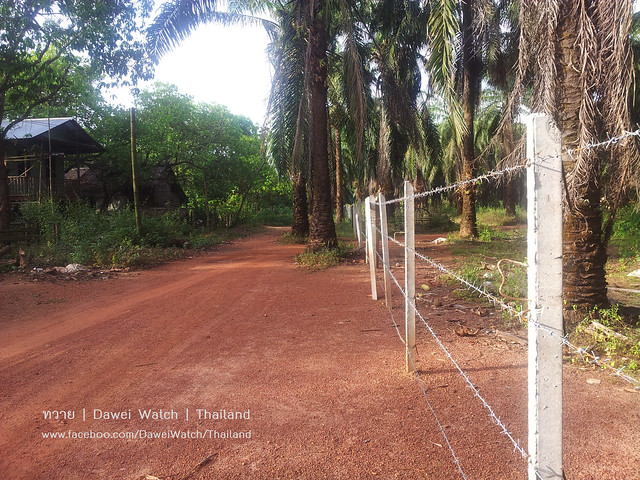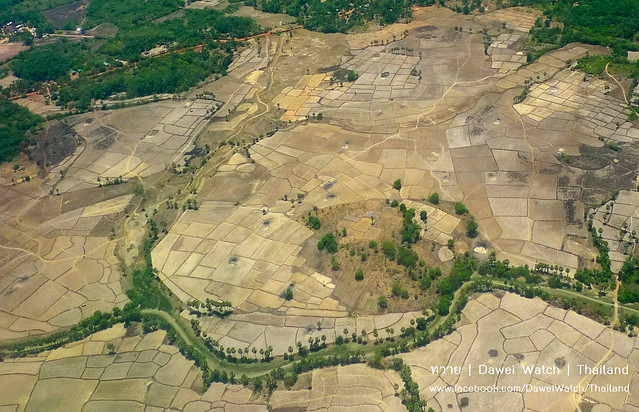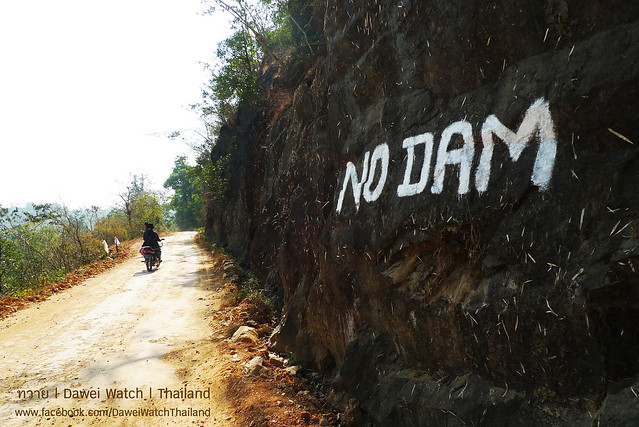News about the visit to Myanmar of Gen. prayuth Chan-O-Cha, Thai Prime Minister and Head of the junta, on 9–10 October indicates that there will be talks between the Thai and Myanmar governments to revive the stalled Dawei Deep Seaport and Industrial Estate projects. Recent daily press reports refer to the economic advantages that could benefit Thailand, and predict the resumption of the project in November.
However, the multiple problems created in the initial three years of the project have not been mentioned.
According to the Dawei Development Association (DDA), on the basis of current information about future work to be carried out, it is estimated that people in 20-36 villages, (comprising approximately 4,384-7,807 households or 22,000-43,000 people), would be directly affected by the construction of the DSEZ and related projects, including an industrial estate, port, road links, reservoirs and resettlement areas.
For those unfamiliar with the project, the agreement to construct the Dawei project was signed in 2008. Initially entrusted to the Italian-Thai Development Company (ITD), it soon ran into difficulties, and was eventually halted, due to the lack of investment to drive forward the gigantic project (which is expected to be eight times larger than the Map Ta Phut petrochemical and industrial estate). Political turmoil in Thailand has also delayed the project, although the government under Yingluck Shinawatra tried very hard to promote it.
Late last year, management responsibility for the project was transferred from ITD to a joint venture entity specially set up between the Thai and Myanmar governments. Known in the jargon as a Special Purpose Vehicle, or SPV, this entity had a registered value of only 12 million baht ($375,000) in November 2013. Investors have been sought throughout this year to commit substantial sums of money to help re-ignite the project. Both governments have agreed that investors in this new phase will compensate ITD in full for the costs it has already incurred, which, at some estimates, run to 6,000 million baht ($187.5 million).
However, there has been little progress as no investors have shown interest in this idea.
In recent news, the present Thai government has announced its intention to push forward this project by persuading the Japanese government to support the investment. Yet the interim government under Gen. prayuth is emphasizing only the macroeconomic aspects of this project, while ignoring the local impacts which remain unresolved such as the uncompensated loss of productive farmlands and forests, inadequate resettlement arrangements, and other environmental and social problems which have been brought about by ITD’s operations so far. The resulting insecurity for the local communities has become such a concern that they have raised complaints to the Human Rights Commissions of both countries. They need to be listened to.
Dawei Watch Thailand interviewed Bo Bo Aung, a member of the Dawei Development Association (DDA), which is a civil society organization in Dawei monitoring this project, to ask about this latest attempt of the Thai and Myanmar governments to revive the Dawei project:
NO DAM: a message from Kalonehtar village where a dam is planned to supply the water for the Dawei industrial estate project. If built, the dam would force all villagers, around 1,000, to move.
What are you feelings about the Dawei project being revived?
The project has brought a lot of changes to Dawei, both positive and negative. But the positive and negatives have been felt by different groups. Most of the negative things have been suffered by the indigenous communities and a lot of problems remained unsolved. We, local Dawei people, have come to realize that, if our participation in decision-making regarding the project is limited, it will bring not benefits but damage.
There are also some risks for investors. There will be another election soon and possibly a new government, with a new policy. The peace process with ethnic armed groups is very fragile. It is very important to realize that the road link to Thailand from the Dawei project crosses a KNU-controlled area. The KNU have left the peace talks and some fighting has restarted. So this would be a very risky decision for investors in the current political situation.
Does the DDA believe the Myanmar government really has the capacity to implement this project properly?
No. We have learned that there have been many failings of the government in the implementation of the Thilawa Special Economic Zone (SEZ) near Yangon. Though the Thilawa SEZ is located close to Yangon, many complaints have been raised about the process and arrangements for resettlement, compensation and land confiscation. The first phase of Thilawa SEZ covers just 400 hectares. This is a very small project compared to the Dawei project which is enormous [approximately 20,000 ha]. JICA is investigating the project to see if it is following their own guidelines. There are a lot of failures in the implementation of the project, such as no meaningful consultation with communities, threats against villagers to pressure them into signing agreements, and not following domestic laws and procedures. Another big failure is the lack of coordination between different government bodies that has made the situation worse. Corruption at every level also remains a big challenge in Myanmar.

Inside and outside the boundary fences of the SEZ zone, the full extent of communities who will be directly affected by the proposed SEZ project has not been properly assessed.
What would DDA like to say about what has already happened in the Dawei project area, and what will happen if the project goes ahead?
A lot of human rights violations and corruption have already occurred in these areas. There has been no transparency and accountability in the project. If the project continues in the same way, you will see very strong opposition from the communities. The trust between important stakeholders has been broken already and this needs to be fixed by respecting human rights and bringing in international best practices.
What should the Myanmar and Thai governments bear in mind if they want to carry on with this project at this time?
The public’s voice. I say it again, the public’s voice. If they want to continue the project, they must listen to the people.
Finally, is there anything you want to say as local Dawei people to the Thai public, Thai government, and investors?
We have learned a lot of lessons over the past 3 years since the project began. We want to maintain a good relationship with the Thai people as we are so similar in many ways.
The Thai people should take responsibility to see that the government does not use their money to contribute to human rights violations in another country, and should pressure their government when it occurs.
Investors must realize that they also face economic/financial risks if they are found to be contributing to and creating negative impacts for local people. The world is so small - it is very important for investors to maintain a good reputation.
To be very clear, Dawei people will not accept any petro-chemical complexes, heavy industries or coal-fired power plants in Dawei.




